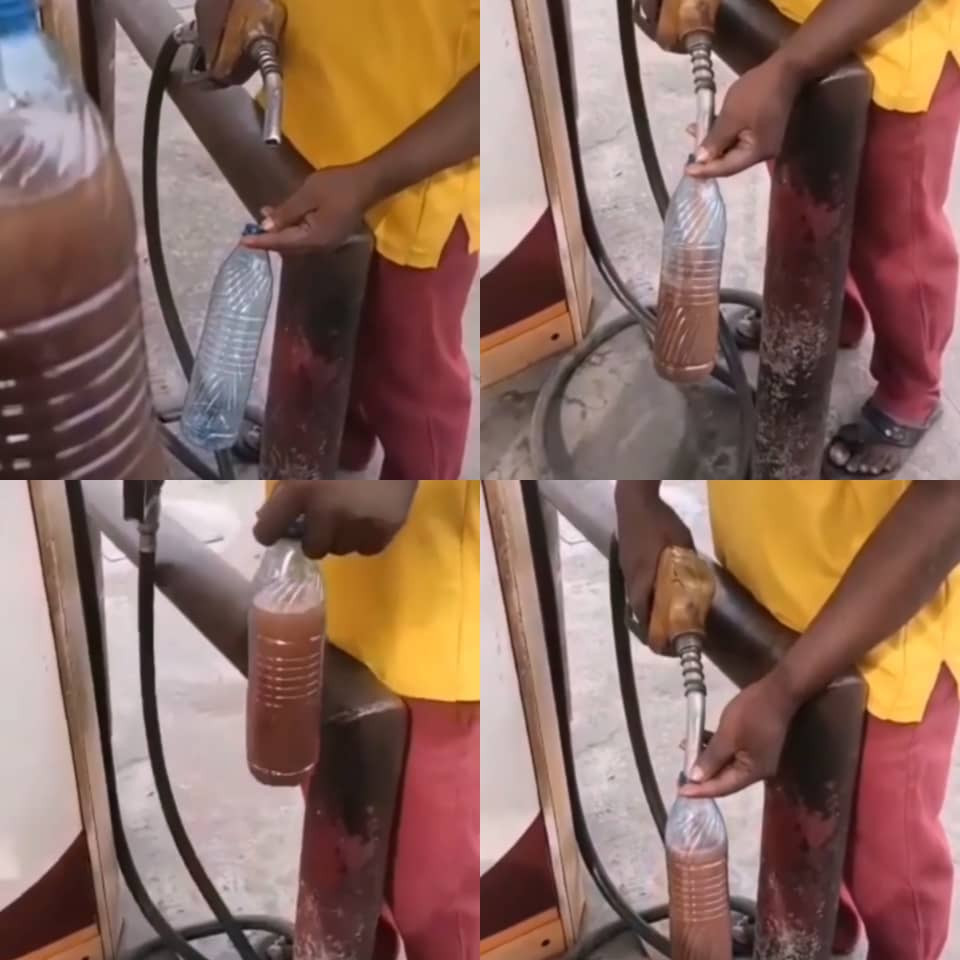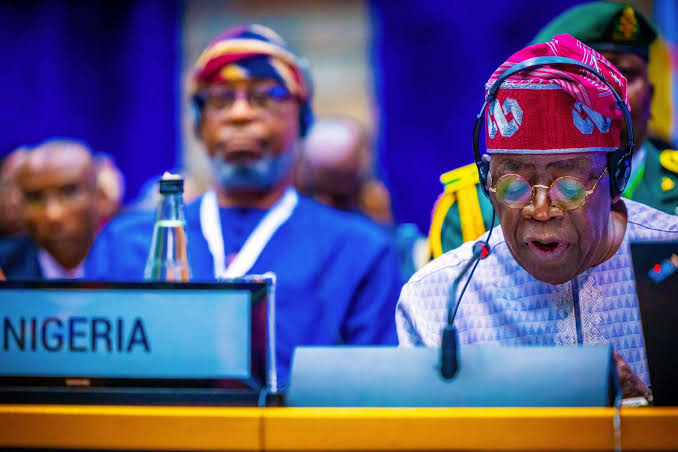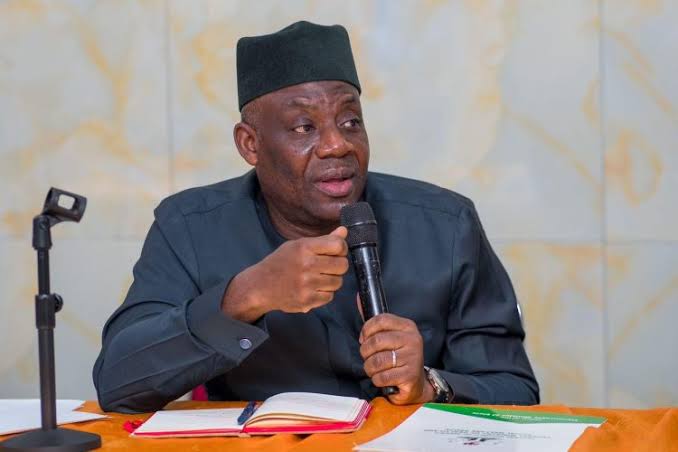The federal government has said it will launch a major investigation into the supply of adulterated petrol which is currently in circulation in the country.
This is as a subsidiary of the Nigerian National Petroleum Corporation (NNPC) has been accused by an oil marketing firm, MRS Oil, of being responsible for the importation of the contaminated petrol.
And as Nigerians across the country continue to reel under the impact of the fuel scarcity caused by the withdrawal of the adulterated petrol, the Nigerian Midstream and Downstream Petroleum Regulatory Authority (NMDPRA) has said there is no need for the current pandemonium at the filling stations.
The authority said there is 20 days’ sufficiency volume of petrol in the country as about 300 million litres of petrol are being discharged at the Apapa Jetty, while a 39,000 metric tonne-vessel is waiting to offload the product.
Minister of state for petroleum resources, Timipre Sylva, disclosed this to State House correspondents after the federal executive council (FEC) meeting presided over by President Muhammadu Buhari at the Presidential Villa, yesterday.
Sylva cautioned against jumping to conclusions about who is to blame for the infraction before the investigation is completed.
“I didn’t expect you to rush to any conclusions. There’ll be a major investigation to unravel everything and then let’s really get to the bottom of it before we can come back and tell you what is going to happen to the culprits,” he said.
Asked whether the issue was discussed at the Council meeting, the minister said: “The issue did not come up in Council, but of course you will recall I was here yesterday to brief Mr President on the issue. I’m not in a position to disclose the identities of the companies, but there are some issues and we are actively tackling it.
“Nobody has, before now, checked for methanol in our fuel; it’s not very usual and this is the first time this is happening and NNPC is very much up to the task.
“I will also convey your question to the NNPC and maybe the Midstream and Downstream Regulatory Authority, but we’re actively handling it and I want to assure you that the problem will be a thing of the past very soon.”
The minister further gave assurance that the government would consider compensating those who may have been adversely affected by the bad fuel.
“We know that some people’s vehicles must have also been damaged; that is also going to be taken into consideration in dealing with the situation,” he said.
Sylva also disclosed that FEC had approved N1.817 billion for the construction of the 17-storey local content building in his home state, Bayelsa.
He said, “You will recall that in 2020, Mr President already commissioned that project. There were some ancillary works that had to be done to connect some of the buildings, and that was now presented to the council for the sum of N1.81 7billion.
This now closes out this contract; this is the full and final payment for everything. So, this is the end of this project and we have completely delivered this to Nigerians.”
Meanwhile, following reports linking MRS Oil Nigeria Plc to the contaminated petrol in the country, the company yesterday denied importing the substandard PMS and accused Duke Oil of being the culprit.
MRS explained that the importation of fuel into Nigeria is solely the responsibility of Duke Oil on behalf of the NNPC, adding that the contaminated fuel was distributed to various retailing companies.
Duke Oil is a subsidiary of the NNPC, acting as the government agency’s trading arm, which makes the firm the only importer of PMS into Nigeria.
In a filing to the Nigerian Exchange Limited yesterday, it was gathered that OVH, MRS, NIPCO, ARDOVA and TOTAL also received the contaminated fuel from NNPC, after it landed in Apapa between the 24th and 30th of January, 2022.
The adulterated fuel was reportedly bought by Duke Oil from international trader, Litasco, and contained 20 per cent methanol, an illegal substance in Nigeria, after it was delivered with Motor Tanker (MT) Nord Gainer.
“Following delivery into tank, it was observed that the product appeared hazy and dark,” MRS said, adding that “the product analysis revealed that the PMS discharged by MT Nord Ganier had 20 per cent methanol, which is an illegal substance in Nigeria.
“As a company, we are aware that alcohol/ethanol is not permitted to be mixed in PMS specification,” the oil and gas company wrote in the filing.
MRS said it had now halted further sales of fuel from its retailing stations, while awaiting NNPC’s decision on replacing the contaminated fuel.
On its part, the Independent Petroleum Marketers Association of Nigeria (IPMAN) has distanced itself from the circulation of adulterated petrol in the country.
IPMAN president, Elder Chinedu Okoronkwo, while responding to LEADERSHIP’s inquiry said the association carried out an internal assessment of the situation and discovered none of its members was involved in the act.
He partly blamed the extension of the implementation of the Petroleum Industry Act, PIA, as responsible for the nationwide embarrassment.
The implementation should have provided guidelines for products’ importation and appropriate sanctions provided under the legislation.
Okoronkwo said as a responsible Association it will continue to provide excellent service by partnering with government and in particular the NNPC to ensure effective petroleum products distribution across the country.
In a related development, NMDPRA chief executive officer, Farouk Ahmed, stated that a technical team had been set up to manage the development, assuring that the fuel queues would soon disappear.
He gave the assurance at a stakeholders’ meeting comprising Major Oil Marketers Association of Nigeria (MOMAN), Depot and Petroleum Marketers Association of Nigeria (DAPMAN) and NNPC, in Lagos.
He said, “Today, I am happy to say that loading is ongoing at various depots in the country. We have been able to identify, isolate and quarantine the limited PMS that was affected by the methanol volume discovered.
“At the moment, six vessels ordered by the NNPC arrived in the country in the last few days, carrying a total volume of 300 million litres.
“This is a means to close the gap that was created by those affected volumes of petrol we have withdrawn from the system.
“Today, we have about 20 days’ sufficiency of petrol in the country. Our ideal is to have 30 days’ volume level.
“Because of the concern, we have to withdraw those vessels which created this gap of 90 million litres to 20 days’ sufficiency.
“But with aggressive importation by the NNPC, this gap will be mitigated in the next few days, according to data we obtained from the NNPC programme.
“Loading is ongoing in most of the depots that have confirmed one specification material, so there is no need to panic.
“Currently, there is 39,000-metric tonne vessel that is about to discharge at the Apapa Single Point Mooring, ASPM, and this vessels will be providing products to major oil marketers, including OVH, TotalEnergies, 11 plc, Conoil, and Ardova, according to loading programme received from MOMAN.
“So, once these vessels complete discharging and start pushing the products to marketers, I believe Lagos will be cleared of shortage. We have gotten that assurance from the marketers.”
Meanwhile, the NNPC Limited has run to trading firms seeking emergency supplies of gasoline to replace cargoes that were rejected because of their poor quality.
Lagos and Abuja are currently facing fuel shortages and queues built up outside some petrol stations over the weekend.
The NNPC is seeking about 500,000 tonnes of petrol, a source told Reuters.
Two sources with direct knowledge of the matter spoke on condition of anonymity due to the sensitivity of the matter.
NNPC did not immediately respond to requests for comment
Nigeria depends almost entirely on imports to meet its domestic gasoline needs after many failed initiatives to revamp its dilapidated refineries. Daily gasoline consumption is roughly 40 million litres.
NNPC handles nearly all these imports through crude-for-fuel contracts, known as direct sale, direct purchase (DSDP), with consortia of local and foreign oil firms.
Each consortium receives 20,000 barrels per day (bpd) of crude oil in exchange for products, making the combined total about 320,000 bpd of Nigeria’s output.
Nigeria produced about 1.5 million bpd of crude in January.
Cheap fuel is one of the few benefits the average Nigerian feels they get from the government, which sets price caps at the pump through a controversial and patchy subsidy scheme.
With soaring oil prices, the emergency stop-gap will be costly. The International Monetary Fund (IMF) on Monday to Nigeria to axe subsidies due to a widening budget deficit.
Do you have any information you wish to share with us? Do you want us to cover your event or programme? For Adverts or report call/WhatsApp us on +2348072633727




